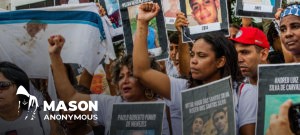“Defenders in conflict settings are courageous men and women who provide emergency relief, ensure access to civilians and document civilian casualties and violations of international law”, said Michel Forst, UN Special Rapporteur on the situation of human rights defenders.
“In post-conflict settings, they may help claiming back the homes of displaced people and challenge impunity”, he continued. “Some are children calling for peace and equal access to education”.
Mr. Forst pointed out that while they face multiple threats to their safety “due to conflict-related insecurity or the very nature of their work”, their contributions too often go unnoticed.
He cited, as an example, when they denounce violations committed by warring parties.
“Women defenders are particularly exposed to gender-based violence, including sexual violence,” flagged the UN export.
According to his report, defenders in conflict and post-conflict situations face serious restrictions on their freedom of expression and assembly.
Their activities are restricted in the name of national security, public order and counter-terrorism, or through obstacles put in place by those in authority over registering non-governmental organizations (NGO), accessing funding, suspending of online communications and cyber-attacks.
Moreover, journalists and NGO staff face arrest and criminal charges for denouncing human rights violations.
Defenders left defenceless
“More countries have recently experienced violent conflict than at any point in the last thirty years”, he pointed out. “Human rights defenders operating in these situations of intense pressure are too often solely responsible for their own protection”.
In his report, he called on States and non-State actors to implement and strengthen protection mechanisms for rights defenders in conflict and post-conflict situations.
“Specific legislation, guidelines and mechanisms to protect them should, therefore, be systemically implemented in order to safeguard their important role in promoting peace, human rights, security and justice”, concluded the Special Rapporteur.
Special Rapporteurs are appointed by the Geneva-based UN Human Rights Council to examine and report back on a specific human rights theme or a country situation. They are part of the Special Procedures, which encompass the largest body of independent experts in the UN Human Rights system. The positions are honorary and the experts are not UN staff, nor are they paid for their work.

